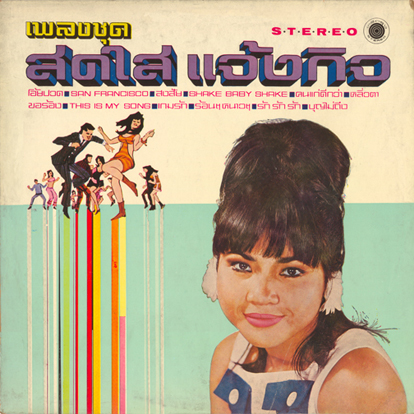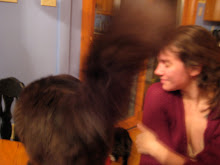
So it's been a few months, but I'm happy to announce to all of my lovely readers that I have completed college. And since a bachelor's degree doesn't necessarily mean a full-time job (I am finding out) I have plenty of spare time to bring you delicious poppy beat-y hip-shakin music in the new year. But first, a big digression that definitely has something to do with music, I promise.
Since school ended, I have been reading a fantastically empowering book called Cunt: A Declaration of Independence by a writer called Inga Muscio.
Muscio is a self-proclaimed "cunt-lovin" feminist, encouraging her readers to reclaim the word "cunt" as a term of empowerment. Her whimsical, we're-best-friends prose makes for entertaining, light reading that gives me something to think about before I turn out the light each night.
Cunt has, in particular, caused me to to think about my own history and experiences with feminism. As a child, I was shuttled from rally to rally by my second-waver mom (who often changed the end of fairy tales so that the women triumphed). She embraced a more militant feminism than the today's so-called "third wave"--a more loose and sexualized kind of girl power.
I'm no fan of the staunch, Andrea Dworkin-like philosophy of shutting down all porn and male sexuality, but I sometimes become nervous about where this new "embrace the sex culture" feminism is going. The most simple definition of a feminist is simply someone who wants women to have the same opportunities as men. But we as a third wave generation, steeped in sex, have made things more complicated. Where does the feminism stop and the exploitation begin?
After reading Muscio's chapter on women and art, I began to think about my own conflicts when it comes to art--in particular my penchant for--okay, obsession with---a genre of music (Ye-Ye)in which women were regularly exploited. Serge Gainsbourg, who wrote many ye-ye hits, had a slew of ladies that he manipulated, particularly the young France Gall.
I can't find this interview below with subtitles, but at about 1:16, Serge asks France what the song Les Sucettes might be about. She answers with the literal meaning, "a girl who really loves lollipops!", and we hear Serge say something to the effect of "No, that's not it". In the video following their conversation France Gall is shown surrounded by dancers-- costumed in phallic lollipop garb-- as the young singer innocently smiles into the camera. The documentary then cuts to an older France, who insists that she didn't know, and felt hurt and shocked when she found out what the song was about.
Do I find the music video for "Les Sucettes" delightful? Yes. Serge Gainsbourg--chauvinistic as he was--is a brilliant song writer. I could sit around and kick myself for loving it so much, but my ultimate conclusion is...why? Why rob myself of such remarkable music?
Sex is great, music is great, and Serge Gainsbourg and his harem of cute French women are just reminding us of the fact--though in some unorthodox ways.
I won't go as far as to say its empowering, but damn, it's pretty fun.
While I sometimes contradict my feminist roots and values with sexually exploited French girls, I can also revel in some of the bad-ass female music that emerged from the 1960s and early 70's pop scenes. In France, the U.S., and even in Thailand, women lyrically used their sexuality and their femininity as weapons--- with some fantastic results.
So thank you for taking the time to read this more "serious" entry (I know, I know, you come here for music ---not politics or personal struggle). As your reward, I present you with ten songs of fucking awesome vintage female assertion that are both empowering and fun!
Find the mix right here!!
The Puppets-"I Ain't Gonna Eat Out My Heart"
I know absolutely nothing about the Puppets, other than that they were a `1960's girl group and shared a name with the obscure Merseybeat band founded by Joe Meek around the same time. This song puts a spin on the Young Rascals' version (originally recorded in 1965) by spinning the gender tables. "I need you boy, but you ain't gonna cheat on me--I ain't gonna eat out my heart anymore, so quit it!"
France Gall-"Laisse Tomber Les Filles" - Another song warning a boy to quit cheating, but France Gall throws a bit more sass into the mix. A particularly tricky song to translate while maintaining the coy but threatening tone (Laisse Tomber les Filles translates as "drop the girls"--)it was re-worked into a fantastic English-language version by April March (formally of the delightfully bratty pop-punk band Shitbirds) in her 1995 song "Chick Habit" that really stayed true to what France was conveying in the original--death threats and all! I have included both France and April's versions on the comp...bonus track!


Dolly Parton-"Dumb Blonde"- I'm not going to lie--- I worship Dolly Parton. I almost cried when I coudn't get tickets to her concert on Halloween this year. She is everything a female pop star should be-- fun, empowering, and smart. "Dumb Blonde", which appeared on the 1967 album Hello, I'm Dolly is a feisty declaration of independence and defiance, and easily one of her best songs.
Minnie and the Kneebones-"Me And My Miniskirt"-Minnie and the Kneebones are another mystery girl band, but damn I love this song. Its a swingin' girl group gem that perfectly captures the scandalous power of the miniskirt's introduction into 1960's society.
Denise & Company-"Boy What'll You Do Then"-Fronted by singer Denise Kaufman, Denise and company pressed only 100 copies of this single. The 1966 song has the signature bluesy harmonica that was overused in 60's psychadelic music, but its cheeky tone works for this song, as Denise threatens to walk away, and "Boy, what'll you do then?"
The Angels-"Get Away From Me"- The Angels were an early sixties girl group consisting of members Barbera Allbut, Phyllis Allbut, and Peggy Santiglia. They were best known, of course, for the 1963 single "My Boyfriend's Back". "Get Away From Me" has an equally bratty quality, and memorably delivers its "you want it but you're never gonna get it" message with attitude to spare.
The What Four-"I'm Gonna Destroy That Boy"-The What Four made their home at Columbia records in the 1960's and deserve an extra pat on the back for playing their own instruments. With I'm Gonna Destroy that Boy, the band invokes the popular mod ideal of fashion=life, by threatening to destroy a boy with their sizzling fashion sense- as well as with their, errr... god-given assets.
Eileen-"Ce Bottes Sont Faites Pour Marcher"-A cute French version of the well known Nancy Sinatra power anthem-"These Boots Are Made for Walkin".
Sodsai Chaengkij-"The Boat That I Row"- I recently picked up a fabulous comp called Thai Beat A Go-Go, and that's where I first heard Chaengkij's adorable version of the 1967 Neil Diamond song. You'll fall for her almost instantly as she cheerfully declares "There ain't no man alive can tell me what to say". She is a mystery otherwise, but according to the liner notes of Thai Beat A Go-Go, Sodsai had a "prolific record output during the 60s and was the most popular singer in Bangkok where she frequently appeared at the famous Lolita Night Club on Rajdamnoen Avenue." Any more info on her would be greatly appreciated.

The fabulous sixties pop singer Lulu also recorded a version that it on youtube for your viewing pleasure. I must say that I prefer Sodsai's, just a tad more.
Laura Lee-"Women's Love Rights"-As far as I'm concerned, Laura Lee's early soul music is a treasure. Her voice is fantastic, and the songs are empowering, cheeky, and marvelously produced. "Women's Love Rights", which came out in 1972, is a rally cry to women around the world in the form of a kickass soul groove-- say enough is enough...and stand up and fight for your love rights!


2 comments:
Right on, right on!
Fascinating insights. The cultural significance of Yé Yé has been construed in so many different ways. One commentator would say it was the first musical movement to be spearheaded by women, while another would say that it was a movement whereby women were subject to a unique and insidiously perverse kind of exploitation: think France Gall and Serge Gainsbourg. Unbelievable.
But there is a unique kind of sexual naivete that is so distinctly Yé Yé. The true extent of emotional and sexual freedom described in songs is a matter of conjecture, but I guess it's important to note that it was teh first time that women were singing about being mistreated by men. Songs like Cette Fille N'est Rien Pour Lui (This Girl Is Nothing To Him) by Maryene and Laisser Tomber Les Filles (Let Go of the Chicks) by France Gall are just two songs that describe two different attitudes in regards to the standards imposed upon women.
Obviously there is some kind of irony that these songs were written by men. But I guess that's not really the point, girls could listen, dance and relate to these songs.. and somehow figure out what it all meant to them.
Post a Comment